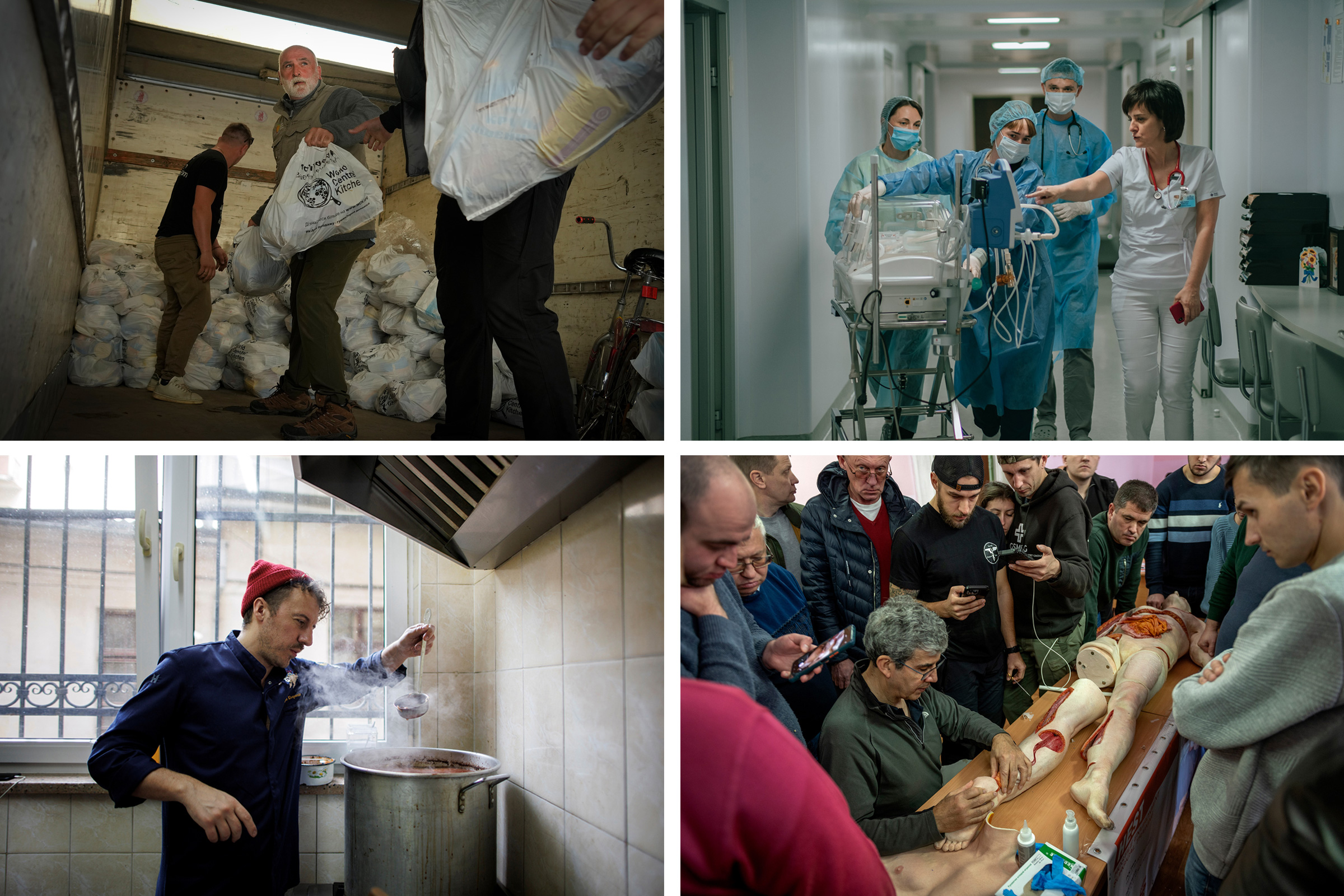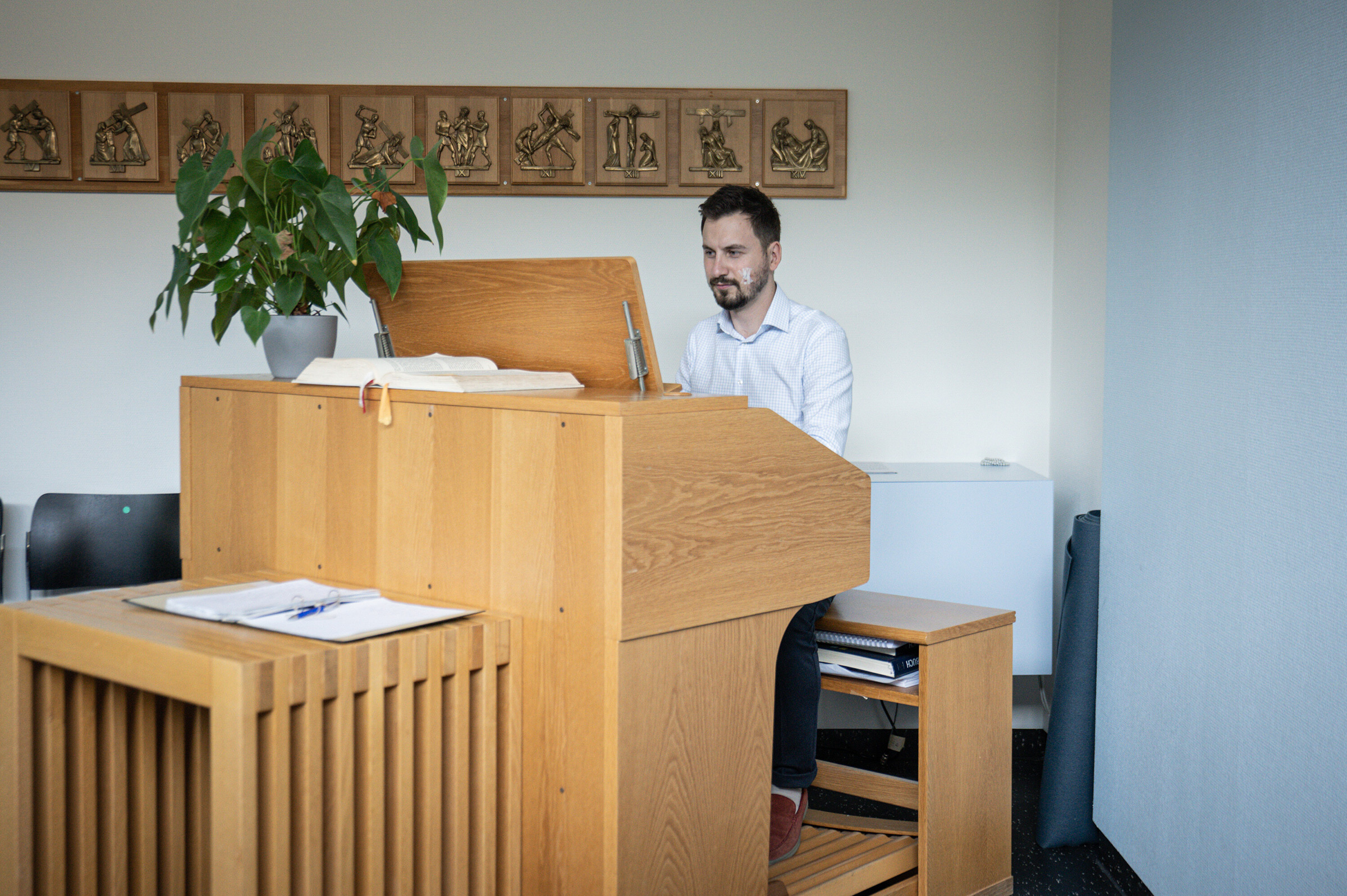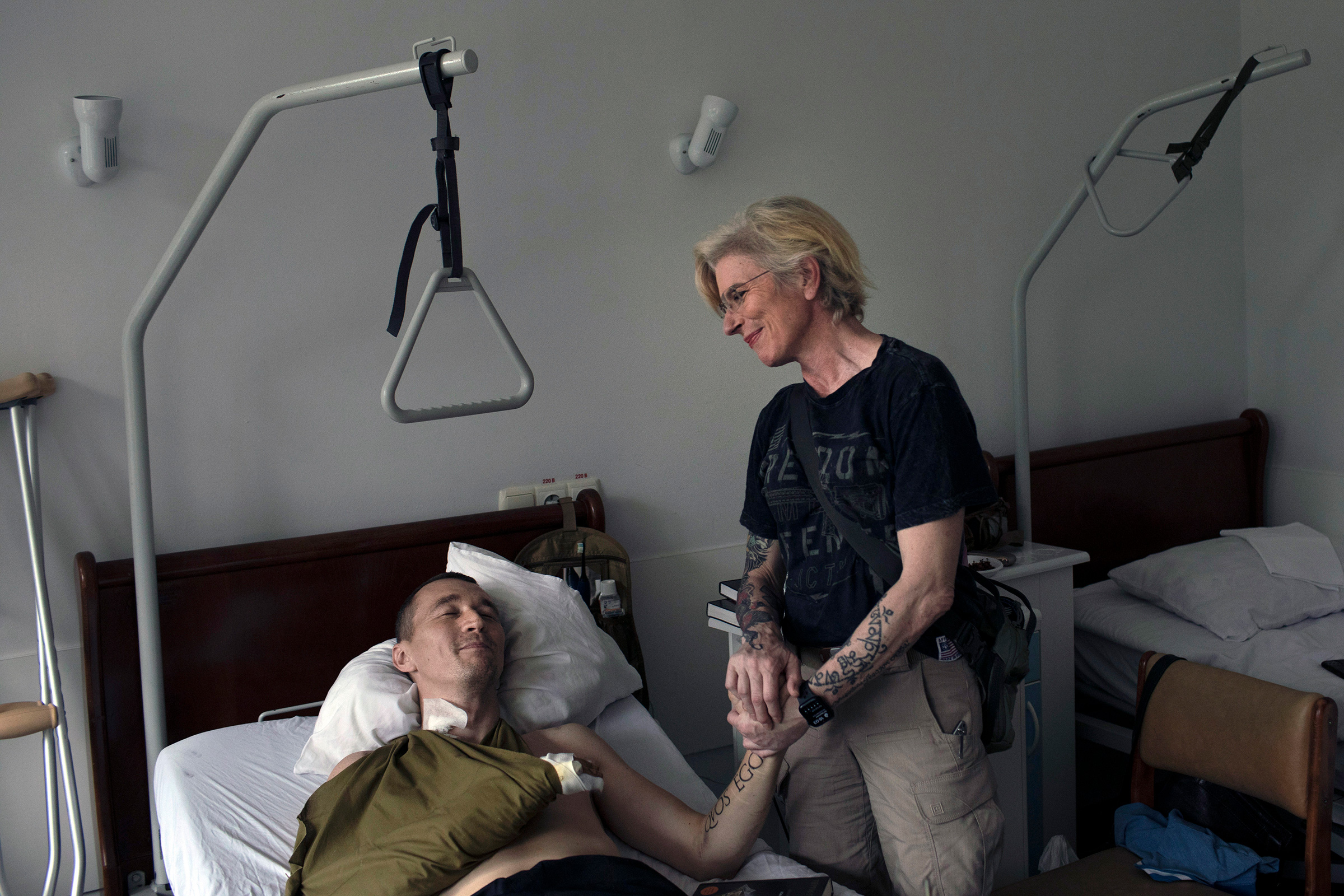Read TIME’s Person of the Year story about Ukrainian President Volodymyr Zelensky.
Even a week before the invasion, with U.S. officials warning that Kyiv might fall in as little as 72 hours, the defense of Ukraine was not actually a lost cause. It was a defining one.
The country’s T-shirted President articulated the choice at hand on March 1, six days after more than 100,000 Russian troops crossed the border. The translator choked up during Volodymyr Zelensky’s speech to the European Parliament, from somewhere in the besieged capital city.
“Life will win over death,” Zelensky said, “and light will win over darkness.”
As he spoke, the world was already sorting itself out, the response to the war coming as quickly as the invaders—quicker, when Russian tanks ran out of gas on the road to Kyiv. The European Union, created to keep the peace within a continent riven for centuries by war, voted to punish the Kremlin in the ways that a bloc of 27 governments can: closing its airspace, sanctioning Vladimir Putin’s cronies, banning imports of at least some Russian petroleum. NATO, formed to defend the same continent against Moscow’s Cold War aggression, found not only new life but also new members, Finland and Sweden signing up.
Whole countries turned on a dime. Germany reversed seven decades of self-enforced pacifism, pledging a €100 billion military revamp and agreeing to send heavy weapons to a conflict zone for the first time since World War II. Poland went from E.U. problem child to hero, its people taking in more than a million Ukrainian refugees and its President one of the first leaders to travel to Kyiv. The U.S. threw open the depot doors on the world’s mightiest arsenal, sending more than $17 billion in arms, materiel, and trainers, plus crucial intelligence and targeting assistance.
Corporations followed suit, fighting the tide of globalization by dealing Russia out. Within months 1,000 firms either pulled up stakes or ceased operations, and the Russian economy moved from growth to contraction.
But the most stirring answers to Zelensky’s imperative came from individuals. Governments and blocs, like companies, have their own interests, to which Putin’s aggression was not only morally offensive but also threatening. And true selflessness, after all, requires a self.

So at his home in the U.K., Dr. David Nott started making plans. “This is an invasion of a democratic country on European soil,” he says. “If it’s allowed to happen in Ukraine, it’s allowed to happen throughout the world. And there are so many places that have the potential for this to happen.”
Nott, 66, is positioned to know. Years earlier, the physician and his wife Elly had set up an organization to train local doctors in how to treat war wounds; while working in Syria he saw the effects of Russian munitions. “I knew that the tactics of the Russians are to bomb and to cause graft injuries and fragmentation injuries and really terrible wounds,” says Nott. “So I knew that that was going to happen.” Since Feb. 24, he has been to Ukraine four times.
Buy a print of TIME’s Person of the Year, featuring Volodymyr Zelensky and the Spirit of Ukraine
Chef José Andrés swung his humanitarian enterprise into a war zone that had been one of the breadbaskets of the world. By November, following the World Central Kitchen model of using local food and local people, 180 million free meals had been served in Ukraine, a literal lifeline in a nation where, six months after the invasion, nearly 7 million people had fled their homes but remained in the country. Meanwhile, Kyiv’s most famous chef, Ievgen Klopotenko, 36, converted his restaurant into a military canteen and later opened a bistro in Lviv offering free meals to refugees. He also did battle against Putin’s assertion that Ukraine had no identity by celebrating the country’s cuisine at every opportunity. Klopotenko says it was “a huge win” when UNESCO recognized borsch as part of Ukrainian heritage. “When you want to feel safe, you eat borsch,” he says. “During the war it became the symbol of survival.”
Most of the $10 billion in humanitarian aid from abroad arrived as cargo, and delivering it entailed risks determined largely by the whims of the enemy. At the rear, cruise missiles and Iranian-made kamikaze drones arrived infrequently but with devastating effect. Closer to the front, people like Sergiy Ivanchuk put their lives in danger every day.
“We thought Russia would take us in a day,” Ivanchuk, 30, recalls. “I thought I’d go to sleep and I’d wake up a part of Russia. But when I woke up and saw that Russia’s effort wasn’t working, I knew I would stay here and help my country win.”

On March 9, he set off from his home in Poltava for Kharkiv—Ukraine’s second largest city, just 22 miles from the border with Russia—to deliver 50 boxes of aid from France, and a haul of gasoline so people could evacuate Kharkiv in their own cars. Russians ambushed him, and his own car was pierced by 30 bullets, his body by five, including a round through a lung. “The nurse thought I was sleeping when she went over to my mom and told her to prepare for death,” recalls Ivanchuk, an aspiring opera singer, who performed a short concert for his doctors before leaving the German hospital where he recovered.
Medical facilities in Kharkiv at the time were less than ideal. Expectant mothers and newborns whose health was already precarious enough for admission to the Regional Perinatal Center were rushed to the basement as the Russian assault began. “Sometimes we are forced to do our work literally between two air raids,” Dr. Iryna Kondratova, a pediatric anesthesiologist, told UNICEF, adding that infants in intensive care must remain upstairs, with the equipment that keeps them alive. Their nurses stayed with them. At one point Russian shells demolished a city square 50 yards away.
“The way in which they fight, and the courage and the resilience that they display in that fight, I think is really inspiring to everybody,” says actor Liev Schreiber, who co-founded BlueCheck Ukraine, to identify, vet, and fund grassroots organizations working in the country, of which there are a lot—41,000, according to one group’s estimate.
The fight had been lonelier eight years earlier, when Russia took Crimea and sections of eastern Ukraine. Now, “it was the complete opposite of 2014,” says Oleg Rogynskyy, 36, a Ukrainian entrepreneur in Silicon Valley who organized the support from the tech world pouring into Ukraine. “A lot of tech is dual use,” he notes, meaning both civilian and military. “I was coming in [thinking] we are on our own. In 2014, people didn’t show up. Countries didn’t show up. That contrast really motivated me.”
Credit the forces of light. This time, Putin’s aggression looked so naked because by Feb. 24, it had been stripped of the obfuscation that cloaked previous incursions, including 2008’s into Georgia. Those offenses had been shrouded by disinformation campaigns that generated just enough uncertainty about what was true to allow Russian forces time to establish “facts on the ground.” NATO called the strategy “hybrid war” and, at the start of 2022, Putin was at it again.
In the jittery days before the invasion, Russia’s forces of darkness staged “attacks” that were actually elaborate provocations, reported by state-owned media as genuine, and then cited by Russian officials as pretext for invasion. The claim on the morning of Feb. 22 was that Ukrainian “terrorists” in Russian-held territory had set off a roadside bomb, killing three people. Gruesome footage panned across human remains.
But this time, these frauds were being exposed by a small army of citizens around the globe—volunteers tracing the foundational facts that underpin all reality, including the internet. Working in the open, comparing notes on Twitter, building trust by always showing their work, they inspected the footage for telling details. For instance: autopsy incisions visible in the charred skulls of the “victims” were clear evidence that cadavers from a morgue had been placed in a vehicle and set alight.

The denizens of “open-source intelligence” (many of them trained by Bellingcat, the pioneering nonprofit that exposed the IED fake) remain on duty, tallying casualties, documenting atrocities, and demonstrating how very much information—and who is allowed access to it—defines the conflict in Ukraine. Because once inside the country, the forces of darkness lived up to their name, taking down the internet everywhere they went. It was a strategy for an invader that, back home, had outlawed the truth. Calling the war a “war” could get you a 15-year prison sentence in Russia.
Ukraine first came back online when Elon Musk activated his low-altitude Starlink satellite internet, as he would later do in Iran. The net was crucial to Ukrainian forces, who were issued the compact, portable Starlink antennas. But in Kyiv, self-described “tech and space nerd” Oleg Kutkov reconstructed a Starlink dish from eBay, and after contacting SpaceX support, caught a signal. “I was the first civilian user of Starlink here in Ukraine,” says Kutkov, 34, who began a Facebook group that has grown to 8,700 people. “They read about me in the news, and they were all worrying about connectivity because the internet is really important here to get all the news, to get notifications and so on.”
It matters immensely. As the world sorted itself between supporters of Ukraine and supporters of Russia, a notably reliable predictor was a country’s access to information—the oxygen of democracy. Each year the human-rights monitor Freedom House publishes a global Net Freedom map that colors countries by the level of access their citizens have to an unfiltered internet. This year’s map bears a striking resemblance to the maps showing each country’s position on Ukraine.
“Our brand [is] one of an honest nation and an honest people trying to tell the truth,” the country’s Minister of Digital Transformation, Mykhailo Fedorov, told TIME in early March, when he was preoccupied with Big Tech, the supranational corporations that girdle the globe and guide events as no one government can. Fedorov wanted them to stop doing business with the invader. “They’re on the side of truth or they’re with Russia,” he said.

So perhaps light is winning over darkness. But life is not winning over death. In the first nine months of the war, some 200,000 fighters have been killed or wounded—half on each side, U.S. officials estimate. The figure does not include Ukraine’s more than 16,000 civilian casualties. As a medic, 53-year-old Julia Payevska treated them all, day and night, in Mariupol, the besieged southern city that held out against Russian forces for more than two months. Known as Taira, she wore a body cam while on duty, capturing wrenching scenes of life, death, and near-death, and shared the footage with a pair of Associated Press reporters—the only international journalists in the city.
In May, when Mariupol was about to fall and the reporters finally evacuated, they smuggled out one last data card. It happened to include footage of Taira helping a wounded Russian soldier. That turned out to be crucial when, after Russian troops entered the city, they recognized Taira and imprisoned her for three months. After the footage was broadcast, she was released in a prisoner exchange.
“When Mariupol was dismantled by aircraft and strikes from the sea, I watched the city die,” she tells TIME. “On this ruin, blood, suffering, we will build a completely new country—not the revival of the old. Unlike Russia, which drags us into the past.”
No one can tell the story of Ukraine like Ukrainians. For Olga Rudenko, the 33-year-old editor of the English-language Kyiv Independent news site, nine months of fighting has shifted the mission from “the fresh shock” of the invasion. “Now the challenge is to find a way to talk about it so that the world continues to care,” she says. “How do we keep telling the stories of human suffering so that people want to continue to read them when in some ways, it’s the same story of Russian troops doing horrible things in Ukraine?”
The answer, of course, resides in the example of the Ukrainians themselves. If the choices their President articulated gave moral clarity to an era we’d mostly been scrolling through, it was people who gave it meaning, by acting.
“There’s such an overwhelming sense of: This is what needs to be done now,” Rudenko says. “This is where we need to be.”
—With reporting by Lisa Abend/Copenhagen, Julia Zorthian/New York, and Dayana Sarkisova/Washington